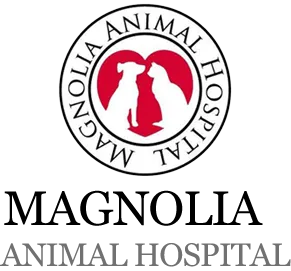Is Your Pet’s Diet Meeting Their Nutritional Needs?
- Magnolia Animal Hospital

- Nov 12, 2024
- 3 min read
Updated: Oct 22, 2025
Ensuring that your pet is receiving a balanced, nutritious diet is one of the best ways to support their health and longevity. But with so many pet food options available, it’s easy to feel overwhelmed. Is your pet’s current diet meeting their nutritional needs? At Magnolia Animal Hospital, we’re here to help you understand the essentials of pet nutrition and provide tips to make sure your furry friend is thriving.

Why Nutrition Matters for Pets
A balanced diet supports every aspect of your pet’s health—from their energy levels and immune function to coat condition and dental health. Nutritional needs vary by species, age, size, activity level, and any specific health concerns your pet may have. Without the right combination of nutrients, pets can develop health issues such as obesity, poor coat quality, and even organ problems.
Key Nutrients Your Pet Needs
Pets need a variety of nutrients to stay healthy. Here are the key components of a well-rounded pet diet:
Proteins
Proteins are the building blocks of muscles, tissues, and organs. They’re essential for growth, repair, and maintaining a strong immune system. Look for pet foods with high-quality protein sources like chicken, fish, or beef as the first ingredient.
Fats
Fats provide energy and support skin, coat, and brain health. Omega-3 and Omega-6 fatty acids, commonly found in fish oil and flaxseed, are especially beneficial for a shiny coat and healthy skin.
Carbohydrates
While carbs are not essential for every pet, they can be a good source of energy. Whole grains and vegetables provide fiber for digestion and a steady energy supply. Avoid foods with excessive fillers like corn or wheat.
Vitamins and Minerals
Vitamins A, D, E, and B-complex, along with minerals like calcium and phosphorus, play a crucial role in maintaining your pet’s health. These nutrients support vision, bone health, immune function, and more.
Water
Water is essential for every bodily function, from digestion to temperature regulation. Ensure that your pet always has access to fresh water, and consider wet food if you’re concerned about hydration.
How to Tell If Your Pet’s Diet Is Sufficient
Here are some signs that indicate whether your pet’s diet is meeting their nutritional needs:
Healthy Weight
Maintaining a healthy weight is a good sign that your pet’s diet is balanced. Overweight or underweight pets may need a diet adjustment to ensure they’re getting the right calorie intake.
Shiny Coat and Healthy Skin
A dull coat, dry skin, or excessive shedding can indicate a nutritional imbalance, especially a lack of essential fatty acids or vitamins.
Good Energy Levels
If your pet has steady energy and enjoys daily activities without signs of lethargy, it’s likely they’re receiving adequate nutrition.
Normal Digestion
Consistent stool quality, lack of gas, and no vomiting or diarrhea are signs of a diet that agrees with your pet. Pets with frequent digestive issues may need a change in diet or a food sensitivity test.

Choosing the Right Pet Food
Selecting the right pet food can be challenging with so many options available. Here are some tips to help you choose wisely:
Check for AAFCO Certification
Look for pet foods that meet the nutritional standards of the Association of American Feed Control Officials (AAFCO). This certification ensures that the food provides balanced nutrition.
Read the Ingredients List
High-quality pet foods list a real protein source (like chicken or salmon) as the first ingredient. Avoid foods that use fillers, by-products, or artificial additives.
Consider Life Stage and Health Needs
Pets have different nutritional needs based on their age, breed, and any specific health issues. Puppies and kittens require higher calorie and nutrient-dense foods, while senior pets often need diets lower in calories and with joint-supporting nutrients.
When to Consult Your Vet
If you’re concerned that your pet’s diet may not be meeting their needs, it’s best to consult your veterinarian. Signs like unexplained weight changes, dull coat, digestive problems, or changes in behavior can be indicators of a nutritional imbalance.
At Magnolia Animal Hospital, we’re here to help. We can provide personalized dietary recommendations based on your pet’s unique needs, health history, and lifestyle. Nutritional counseling is an important part of preventive care and can help prevent health problems down the road.
Conclusion
A balanced diet is key to keeping your pet happy and healthy. By understanding the basics of pet nutrition and choosing high-quality food, you can ensure that your furry friend gets all the nutrients they need. If you’re unsure whether your pet’s diet is optimal, or you’d like guidance on selecting the right food, don’t hesitate to reach out to us at Magnolia Animal Hospital.
Contact us today to schedule a consultation and give your pet the nutritional support they deserve!








Comments